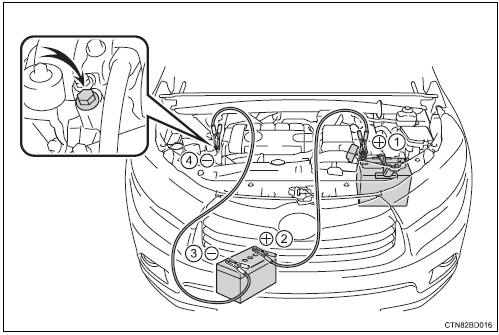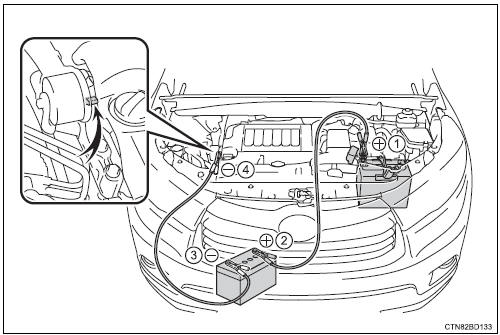Toyota Highlander Owners Manual: If the vehicle battery is discharged
The following procedures may be used to start the engine if the vehicle’s battery is discharged.
You can also call your toyota dealer or a qualified repair shop.
If you have a set of jumper (or booster) cables and a second vehicle with a 12-volt battery, you can jump start your vehicle by following the steps below.
- Open the hood.
- Connect the jumper cables according to the following procedure:
- 2.7 L 4-cylinder (1ar-fe) engine

- 3.5 L v6 (2gr-fe) engine

- Connect a positive jumper cable clamp to the positive (+) battery terminal on your vehicle.
- Connect the clamp on the other end of the positive cable to the positive (+) battery terminal on the second vehicle.
- Connect a negative cable clamp to the negative (-) battery terminal on the second vehicle.
- Connect the clamp at the other end of the negative cable to a solid, stationary, unpainted metallic point away from the battery and any moving parts, as shown in the illustration.
- Start the engine of the second vehicle. Increase the engine speed slightly and maintain at that level for approximately 5 minutes to recharge the battery of your vehicle.
- Vehicles with a smart key system: open and close any of the doors of your vehicle with the engine switch off.
- Vehicles without a smart key system:
maintain the engine speed of the second vehicle and turn the
engine switch to the “on” position, then start the vehicle's engine.
Vehicles with a smart key system: maintain the engine speed of the second vehicle and turn the engine switch to ignition on mode, then start the vehicle's engine.
- Once the vehicle’s engine has started, remove the jumper cables in the exact reverse order from which they were connected.
Once the engine starts, have the vehicle inspected at your toyota dealer as soon as possible.
Starting the engine when the battery is discharged
The engine cannot be started by push-starting.
To prevent battery discharge
- Turn off the headlights and the audio system while the engine is off.
- Turn off any unnecessary electrical components when the vehicle is running at a low speed for an extended period, such as in heavy traffic.
When recharging or replacing the battery
- Vehicles with a smart key system: in some cases, it may not be possible
to
unlock the doors using the smart key system when the battery is discharged.
Use the wireless remote control or the mechanical key to lock or unlock the doors.
- Vehicles with a smart key system: the engine may not start on the first attempt after the battery has recharged but will start normally after the second attempt. This is not a malfunction.
- Vehicles with a smart key system: the engine switch mode is memorized by
the vehicle. When the battery is reconnected, the system will return to the
mode it was in before the battery was discharged. Before disconnecting the
battery, turn the engine switch off.
If you are unsure what mode the engine switch was in before the battery discharged, be especially careful when reconnecting the battery.
- Vehicle with power back door: the power back door must be initialized.
Charging the battery
The electricity stored in the battery will discharge gradually even when the vehicle is not in use, due to natural discharge and the draining effects of certain electrical appliances. If the vehicle is left for a long time, the battery may discharge, and the engine may be unable to start. (The battery recharges automatically during driving.)
 Warning Warning
Observe the following precautions to prevent accidentally igniting the flammable gas that may be emitted from the battery:
Battery precautions The battery contains poisonous and corrosive acidic electrolyte, while related parts contain lead and lead compounds. Observe the following precautions when handling the battery:
|
 Notice Notice
When connecting the jumper cables, ensure that they do not become entangled in the cooling fan or engine drive belt. |
 Starting the engine
Starting the engine
Ensure that the shift lever is in p and depress the brake pedal.
Touch the toyota emblem side
of the electronic key to the
engine switch.
When the electronic key is
detected, a buzzer sou ...
 If your vehicle overheats
If your vehicle overheats
The following may indicate that your vehicle is overheating.
The needle of the engine coolant temperature gauge
Enters the red zone or a loss of engine power is experienced. (For
example, the ...
More about Toyota Highlander:
Supplemental restraint system
TORQUE SPECIFICATION
SEAT BELT
TORQUE SPECIFICATION
WIPER & WASHER
TORQUE SPECIFICATION
INSTRUMENT PANEL/METER
TORQUE SPECIFICATION
...
